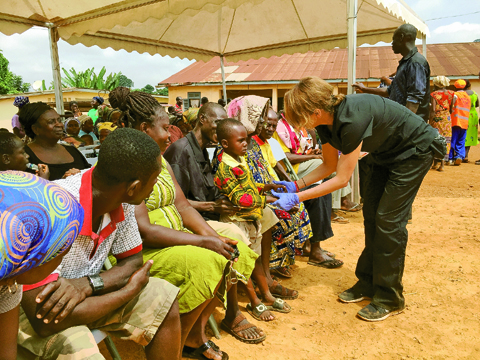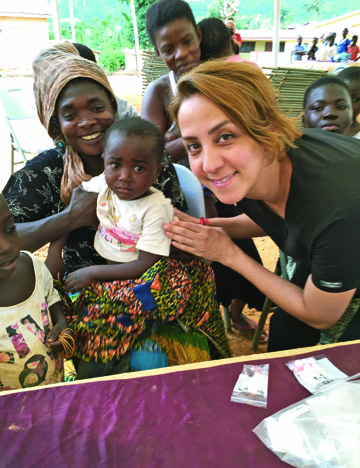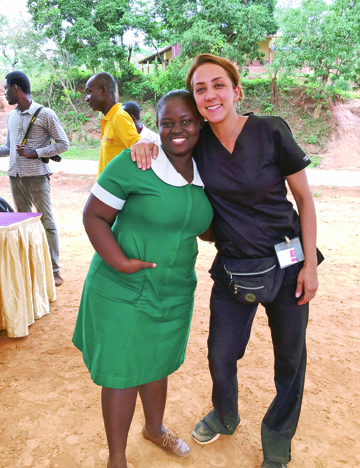by Shideh Kerman, AFC Urgent Care Denver, B.Eng., MBA
 As I rode the bus to Akyem, a small village in Ghana, I wondered what I could expect in this new place. I found myself embarking on a new journey after an inspiring discussion with a doctor who had been on one of the medical trips to Africa. I was sold — it sounded like the perfect opportunity for me to help a group of medical professionals set up clinics in rural villages.
As I rode the bus to Akyem, a small village in Ghana, I wondered what I could expect in this new place. I found myself embarking on a new journey after an inspiring discussion with a doctor who had been on one of the medical trips to Africa. I was sold — it sounded like the perfect opportunity for me to help a group of medical professionals set up clinics in rural villages.
We selected Ghana as our destination because of the low access of population to hospitals and medical facilities in the villages. The quality of healthcare varies across Ghana, with the smaller communities experiencing the most difficulty in obtaining quality service. Patients in villages either rely on traditional medicine or travel great distances for more comprehensive healthcare. The formerly operated system of health, known as “Cash and Carry,” led to countless deaths, as many lacked money to pay for their healthcare needs. Under that system, the health need of an individual was only attended to after payment, even in emergency cases. With a third of Ghanaians living on less than a dollar a day, healthcare is out of reach for many.
Despite these challenges, the Ghanaians I met were incredibly kind, and quick to offer any type of help. Upon my return, I felt rejuvenated, and I wondered — why do I feel so good? While the mental health benefits of volunteering have long been understood, there is research that suggests the advantages are more extensive than one may even imagine. Here are just a few of the many benefits of volunteering:
- Improve Your Health And Live Longer
Studies show that when people think about helping others, they activate a part of the brain called the mesolimbic pathway, which is responsible for feelings of gratification. Helping others doles out happiness chemicals, including dopamine and endorphins that block pain signals and oxytocin. Beside the mental benefits, Volunteering can have huge health benefits, including a reduced chance of heart disease, lessening of chronic pain, and even a longer life. Carnegie Mellon University published a report indicating that adults, aged 51 to 91, who reported at least 200 hours of volunteer work in the last year were 40% less likely to develop high blood pressure than those who did not volunteer. The health benefits of volunteering seem to only be extended to those who devote a “considerable” amount of time — about two hours per week. Older adults seem to benefit the most, possibly due to poorer health associated with aging, but people of all ages can benefit physically from the art of giving.
- Become A Leader In Your Field
When I traveled to Ghana I didn’t know how I could be of help. My experience is mostly building clinics and improving operations in high patient volume medical clinics. And that is exactly what I did in Ghana, with the difference that I had only hours to set up clinics and had to improve operations to accommodate up to 400 patients daily. It was not easy but definitely helped me with my lead ership skills.
ership skills.
Leadership skills can certainly be cultivated in students, but costly university programs can fall short in attempts to teach this skill. International Corporate Volunteerism (ICV) is a relatively new approach that provides development opportunities abroad for top talent within the corporate realm. This type of learning provides employees with direct exposure to adapting and problem solving in a new environment. Lessons like these can’t be taught in a classroom. A recent George Washington University study found that ICV programs are more effective at leadership development, both in cost and the diversity of learning, than elite, academic programs. And according to Josh Bersin, an expert on talent development, fostering employees who are successfully able to lead is the most critical indicator of a corporation’s future performance.
- Career Opportunities Await
If you are searching for a job, or are in a transition to switch to a new job, why not be proactive and join a non-profit organization instead of just waiting for the unknown. Volunteer experience has long been an afterthought in career portfolios. However, this has been changing, as more nonprofit organizations try to utilize skilled volunteers and more employers consider volunteer work when evaluating job candidates. An article in The New York Times explains that volunteering is recently becoming more important for highly skilled professionals. For example, LinkedIn, a professional networking site, responded to overwhelming feedback by adding a field for members to list their volunteer work. A survey found that 41% of employers said they consider volunteer work as important as paid work, and 20% said they made a hiring decision based on volunteer work.
- People Who Volunteer Are Happier
“Volunteering moves people into the present and distracts the mind from the stresses and problems of the self,” said Stephen G. Post, founding director of the Center for Medical Humanities in New York. Volunteering activates “happiness chemicals” that help block pain signals and relieve stress. Furthermore, while somewhat counterintuitive, plenty of research indicates giving back can be beneficial to those who suffer from acute or even chronic depression, helping individuals to gain perspective on their life and reduce stress.
How Do I Begin?
Thousands of well-meaning people around the globe yearn to donate or get involved in some way, but are unsure of the best way to give back. Most of us lack knowledge of the real issues within our community or around the world. Volunteering, rather than donating, can sometimes give more tangible results that may ultima tely be more satisfying.
tely be more satisfying.
Start by doing research on your chosen charity before committing your skills and time. No matter your values, skills, age, or background, Africa and many other third world countries have opportunities for you to make a difference. However, do not discount opportunities to volunteer within your local community. No matter where you choose to give back, it is truly a win-win for all involved. Volunteering is good for the soul, and is in many ways, an expression of appreciation for life itself.

